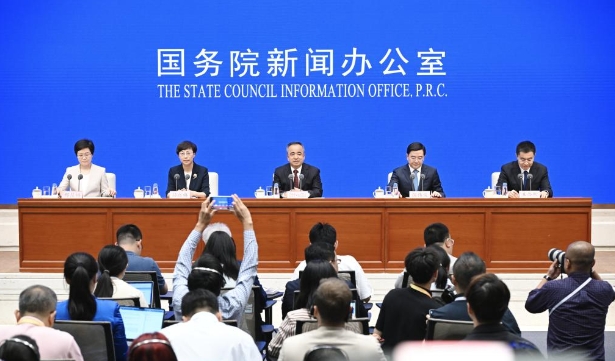Xinjiang's high-quality development, opening-up endeavors yield fruitful results

Provincial officials of northwest China's Xinjiang Uygur Autonomous Region attend a press briefing in Beijing, capital of China, May 21, 2024.(Xinhua/Chen Yehua)
Northwest China's Xinjiang Uygur Autonomous Region has seen remarkable growth across key economic indicators since last year, with its growth rates of GDP, investment, consumption, import and export, fiscal revenue and resident income levels all ranking among the top five nationwide.
Erkin Tuniyaz, chairman of the regional government, highlighted these achievements during a press briefing held in Beijing on Tuesday, noting that "2023 marked the best year in terms of the quality and efficiency of economic and social development in Xinjiang in recent years."
Xinjiang has committed to expanding high-level domestic and international opening up, building itself into an important corridor linking Asia and Europe and a gateway for China's opening up in the west, said Erkin Tuniyaz.
Over the past two years, Xinjiang's total import and export volumes have surged by 57 percent and 45.9 percent, respectively.
"Over a span of 15 years, we witnessed Xinjiang's import and export volume grow from 100 billion yuan (about 14 billion U.S. dollars) in 2007 to 200 billion yuan in 2022. ... Last year, this figure reached 357.3 billion yuan, and we anticipate yet another milestone this year, reaching 400 billion yuan," said Chen Weijun, executive vice chairman of the regional government of Xinjiang.
To advance the China (Xinjiang) Pilot Free Trade Zone (FTZ), the first in China's northwestern border regions and the country's youngest, established in November 2023, Xinjiang will focus on building an open and distinctive industrial system, constructing a comprehensive logistics hub connecting Eurasia and enhancing trade facilitation, said Sun Hongmei, vice chairperson of the Xinjiang regional government.
Meanwhile, the region is actively constructing a modern industrial system. Based on its rich resources and industrial foundation, Xinjiang is accelerating the development of major industrial clusters including oil and gas, coal and coal-fired power generation, a coal chemical industry, green mining and strategic emerging industries. The integrated development of primary, secondary and tertiary industries is increasingly improving, according to Erkin Tuniyaz.
He highlighted Xinjiang's roles as a strategic base for China's energy and resource security, and a crucial supply base for high-quality agricultural and pastoral products used nationwide.
In the first quarter of 2024, Xinjiang's GDP grew by 5.6 percent year on year, the value-added industrial output of enterprises above designated size increased by 8 percent, while its foreign trade volume expanded by 42.7 percent. These indicators exceeded expectations, confirming a promising start to 2024, Erkin Tuniyaz said.
Last year, Xinjiang saw its grain planting area increase by 390,666 hectares to reach over 2.8 million hectares, while its grain output increased by 3.05 million tonnes to reach over 21 million tonnes. Additionally, as the nation's major cotton production base, Xinjiang has maintained its position as the top producer in both total output and unit yield for cotton for 30 consecutive years, according to Erkin Tuniyaz.
This year, the region's target is to maintain cotton production above 5 million tonnes, and boosting grain output by at least 1 million tonnes, he noted.
Erkin Tuniyaz also underscored the region's efforts in pushing forward its renewable energy sector over the past few years.
In 2023, solar and wind power generation in Xinjiang accounted for 4.6 percent and 7.3 percent of the national total, respectively. It will accelerate the establishment of clean energy bases, focusing particularly on wind and solar power.
Xinjiang has intensified efforts to improve people's wellbeing.
The region has increased investment in education, offering 15 years of free education from kindergarten to high school in southern Xinjiang, Erkin Tuniyaz said.
A series of measures to boost employment have been implemented. In 2023, the region created 482,200 new urban jobs.
In terms of healthcare, Erkin Tuniyaz said high-quality medical resources have been introduced at the grassroots level, fostering a healthcare service network covering both urban and rural areas.
To date, Xinjiang has constructed 2.7 million earthquake-resistant houses in rural areas, accommodating over 11 million farmers and herdsmen, said Erkin Tuniyaz.
Editor:伏娅敏
